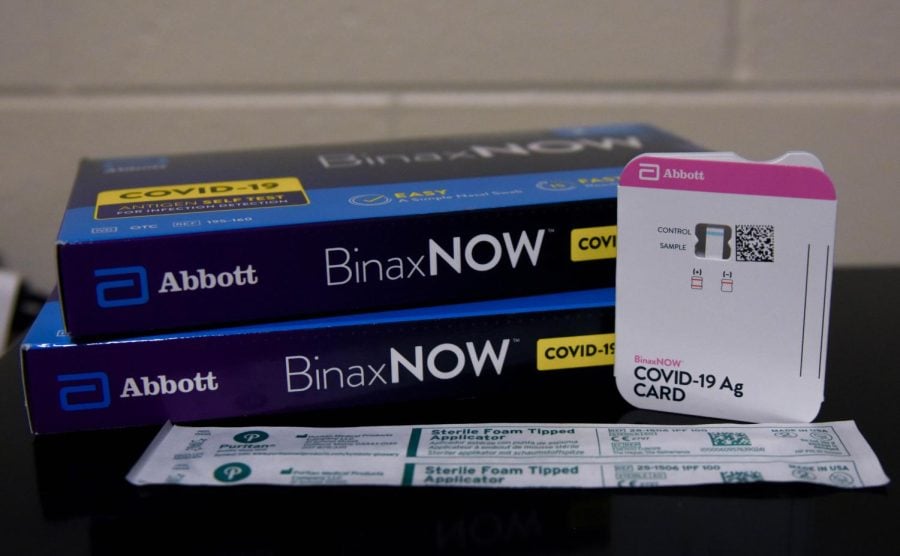Winter spread of COVID-19, RSV and flu hit Evanston and surrounding communities
Daily file photo by Angeli Mittal
Spikes in COVID-19, RSV and flu this winter have placed strain on local medical systems.
January 22, 2023
COVID-19, respiratory syncytial virus and the flu are heavily impacting Evanston medical systems this winter.
COVID-19 hospitalizations at the NorthShore University HealthSystem’s Evanston Hospital approximately doubled in the months leading up to Jan. 10, according to Chief of Emergency Medicine Dr. Ernest Wang.
“Our ability to take care of anyone who comes through the door has been challenged by not just flu, RSV and COVID, but in general,” Wang said. “If you’re going to be admitted to the hospital, you need to be in an isolation room, and so that can take more time.”
Monthly Evanston resident emergency room visits for COVID-19 peaked between November and December at more than 100, according to data shared with The Daily on Jan. 20 by Evanston Director of Health & Human Services Ike Ogbo. Monthly visits to the ER for the flu peaked between December and January, at about 100, while visits for RSV peaked between September and October, at about 30 during the month.
Monthly ER visits for COVID-19 totaled about 50 cases two months before they spiked.
For the flu, monthly visits totaled fewer than 30 cases two months before its peak this winter. For RSV, monthly visits were fewer than 10 prior to its fall peak.
Wang also said RSV hospital visits to Evanston Hospital spiked in October. Flu visits spiked from November to December, he said.
“All three (illnesses) together at once was additive,” Wang said. “A number of people got sick from all three.”
Masking and social distancing over the past three years helped decrease RSV and flu transmission, Wang said. But as measures blocking respiratory disease transmission have eased, RSV and flu made a comeback.
The symptoms of these two illnesses became more severe because of immunity gaps, which describe how a pathogen can more severely harm someone’s body if they haven’t been exposed to it in a long time, Wang added.
The immunity gap for RSV, which more heavily affects children and older people, has created particular challenges for local and state medical systems in recent months.
“The kids that got RSV this year were sicker than kids that historically get the virus,” Wang said. “That really taxed our system and created a lot of capacity issues. We actually had to transfer patients out of state at times because there were no pediatric beds in the entire state.”
But as people’s immune systems become accustomed to these viruses again, Wang said the immunity gap will likely shrink.
For Dr. Steven Fox, who works at Northwestern Medicine’s Sherman Avenue facility, this year’s wave of flu was particularly surprising because of how early it began. Usually, the flu affects the Chicago area in February, March and April, he said.
Fox added that flu cases could peak again, following patterns in parts of the southern hemisphere. The travel season has also left him “inundated with patients testing at home that have COVID,” he added.
As an internal medicine specialist, Fox usually sees patients for chronic diseases like diabetes. However, he hasn’t seen many severe COVID-19, RSV or flu cases in his patients with preexisting conditions, he said.
“Patients have been fairly well-protected because of the vaccine and the availability of Paxlovid,” Fox said. Paxlovid is a drug that treats COVID-19.
Outside of the medical community, locals like Wilmette resident Lauren Merchant have noticed these diseases’ heightened transmission. Merchant’s oldest son came down with cold symptoms in early October. She said she struggled to find a local urgent care with the capacity to see him.
“I was driving around on a Saturday afternoon, and all the urgent cares were full in the area to the point where they stopped picking up the phone,” Merchant said. “We kind of had to wait it out.”
Her son recovered, and the rest of her family hasn’t contracted any serious respiratory diseases since. However, Merchant said she keeps hearing about friends who have sick children at home for weeks on end.
Merchant said she’s seen discussions around COVID-19, RSV and flu reflect how the pandemic changed the way people see sickness.
“Now, people have a strange threshold for how sick you can be,” she said. “People are confused about how to really think… Could it be RSV? Is it flu? Do you quarantine? Do you mask? Is this going to get worse, or is this just two kids with random colds or stomach bugs?”
Email: williamtong2026@u.northwestern.edu
Twitter: @william2tong
Related Stories:
— Northwestern to discontinue COVID-19 asymptomatic testing in Winter Quarter
— The Daily Explains: Navigating COVID-19, monkeypox and the flu this season



